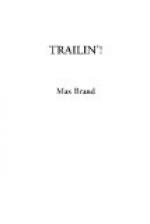“The most fool idea I ever heard. Sounds like something in a dream—a nightmare. What d’you want to do, Anthony, make yourself famous? You will be, all right; they’ll put up your tombstone by a public subscription.”
He would not answer, sure of himself; waiting, tingling with enjoyment.
As he expected, she said: “Go on; is the other reason as good as that one?”
Making his expression grim, he leaned suddenly forward, and though the width of the room separated them, she drew back a little, as though the shadow of his coming cast a forewarning shade across her. He heard her breath catch, and as if some impalpable and joyous spirit rushed to meet and mingle with his, something from her, a spirit as warm as the fire, as faintly, keenly sweet as an air from a night-dark, unseen garden blowing in his face.
“The other reason is you, Sally Fortune. You can’t go with me as far as I must go; and I can’t leave you behind.”
Ah, there it was! He had fumbled at the keys of the organ in the dark; he had spread his fingers amply and pressed down; behold, back from the cathedral lofts echoed a rising music of surpassing beauty. Like the organist, he sank back again in the shadow and wondered at the phrase of melody. Surely he had not created it? Then what? God, perhaps. For her lips parted to a smile that was suggested rather than seen, a tender, womanly sweetness that played about her mouth; and a light came in her eyes that would never wholly die from them. Afterward he would feel shame for what he had done, but now he was wholly wrapped in the new thing that had been born in her, like a bird striving to fly in the teeth of a great storm, and giving back with reeling, drumming wings, a beautiful and touching sight.
Her lips framed words that made no sound. Truly, she was making a gallant struggle. Then she said: “Anthony!” She was pale with the struggle, now, but she rose bravely to her part. She even laughed, though it fell short like an arrow dropping in front of the target.
“Listen, Bard, you make a pretty good imitation of Samson, but I ain’t cut out for any Delilah. If I’m holding you here, why, cut and run and forget it.”
She drew a long breath and went on more confidently: “It ain’t any use; I’m not cut out for any man—I’d so much rather be—free. I’ve tried to get interested in others, but it never works.”
She laughed again, more surely, and with a certain hardness like the ringing of metal against metal, or the after rhythm from the peal of a bell. With deft, flying fingers she rolled a cigarette, lighted it, and sat down cross-legged.
Through the first outward puff of smoke went these words: “The only thing that’s a woman about me is skirts. That’s straight.”
Yet he knew that his power was besieging her on every side. Her power seemed gone, and she was like a rare flower in the hollow of his hand; all that he had to do was to close his fingers, and—He despised himself for it, but he could not resist. Moreover, he half counted on her pride to make her break away.




